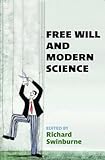Free will and modern science / edited by Richard Swinburne. [print]
Material type: TextSeries: British Academy original paperbacksPublication details: Oxford ; New York : Oxford University Press, (c)2011.Description: xviii, 206 pages : illustrations ; 24 cmContent type:
TextSeries: British Academy original paperbacksPublication details: Oxford ; New York : Oxford University Press, (c)2011.Description: xviii, 206 pages : illustrations ; 24 cmContent type: - text
- unmediated
- volume
- 9780197264898
- BJ1461.O98.F744 2011
- COPYRIGHT NOT covered - Click this link to request copyright permission: https://lib.ciu.edu/copyright-request-form
| Item type | Current library | Collection | Call number | Status | Date due | Barcode | |
|---|---|---|---|---|---|---|---|
| Withdrawn | G. Allen Fleece Library WITHDRAWN | Non-fiction | BJ1461.S978.F744 2011 (Browse shelf(Opens below)) | Not for loan | 31923001736319 |
Browsing G. Allen Fleece Library shelves, Shelving location: WITHDRAWN, Collection: Non-fiction Close shelf browser (Hides shelf browser)
| No cover image available | No cover image available | No cover image available |

|

|
No cover image available | No cover image available | ||
| BJ1461.F3 1960 The freedom of the will /by Austin Farrer. | BJ1461.H57 1993 How free are you? : the determinism problem / | BJ1461.N4 1961 Determinism and freedom in the age of modern science /Sidney Hook, editor. | BJ1461.S978.F744 2011 Free will and modern science / | BJ1461.T567.F744 2013 Free will : sourcehood and its alternatives / | BJ1461.W55 1993 The question of free will : a holistic view / | BJ1468.5.A77 How to make the right decisions /John D. Arnold, Bert L. Tompkins. |
"Published for the British Academy by Oxford University Press."
Includes bibliographies and index.
Introduction : plan of the volume/ richard Swinburne -- Does brain science change our view of free will? / Patrick Haggard -- Libet and the case for free will scepticism/ Tim Bayne -- Physicalism and the determination of action/ Frank Jackson -- Dualism and the determination of action/ Richard Winburne -- On determinacy or its absence in the brain/ Harald Atmanspacher and Stefan Rotter -- Godel's incompleteness theorems, free will and mathematical thought/ Solomon Feferman -- Feferman on Godel and free will : a response to chapter 6/ J.R. Lucas -- The impossibility of ultimate responsibility? / Galen Strawson -- Moral responsibility and the concept of agency/ Helen Steward -- Substance dualisma nd its rationale/ Howard Robinson -- What kind of responsibility must criminal law presuppose? / R.A. Duff.
"Do humans have a free choice of which actions to perform? Three recent developments of modern science can help us to answer this question. First, new investigative tools have enabled us to study the processes in our brains which accompanying our decisions. The pioneer work of Benjamin Libet has led many neuroscientists to hold the view that our conscious intentions do not cause our bodily movements but merely accompany them. Then, Quantum Theory suggests that not all physical events are fully determined by their causes, and so opens the possibility that not all brain events may be fully determined by their causes, and so maybe - if neuroscience does not rule this out - there is a role for intentions after all. Finally, a theorem of mathematics, Godel's theory, has been interpreted to suggest that the initial conditions and laws of development of a mathematician's brain could not fully determine which mathematical conjectures he sees to be true. Papers by Patrick Haggard, Tim Bayne, Harald Atmanspacher and Stefan Rotter, Solomon Feferman, and John Lucas investigate these issues. The extent to which human behaviour is determined by brain events may well depend on whether conscious events, such as intentions, are themselves merely brain events, or whether they are separate events which interact with brain events (perhaps in the radical form that intentions are events in our soul, and not in our body). The papers of Frank Jackson, Richard Swinburne, and Howard Robinson investigate these issues. The remaining papers, of Galen Strawson, Helen Steward, and R.A. Duff, consider what kind of free will we need in order to be morally responsible for our actions or to be held guilty in a court of law. Is it sufficient merely that our actions are uncaused by brain events, or what?."--Publisher's description.
COPYRIGHT NOT covered - Click this link to request copyright permission:
There are no comments on this title.
